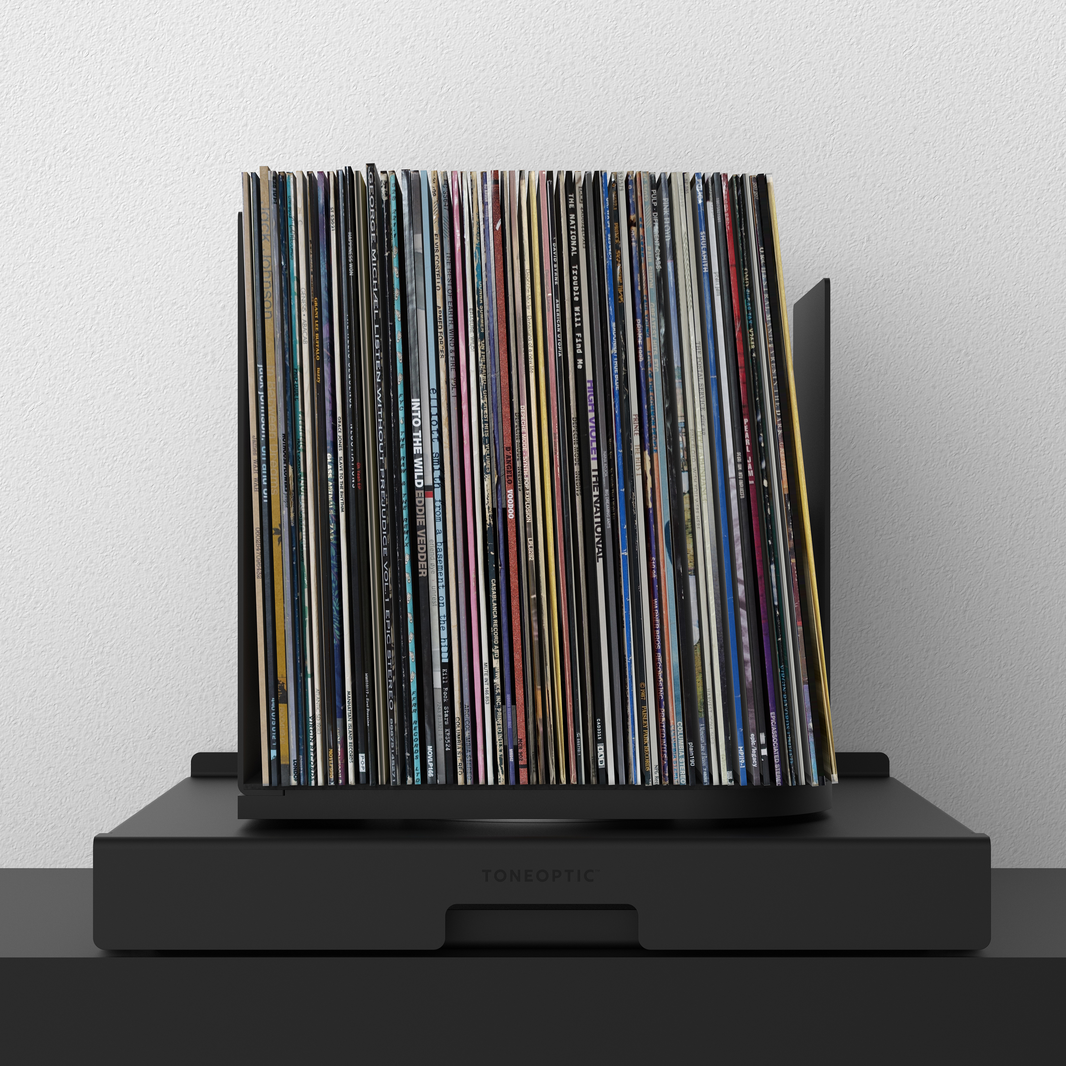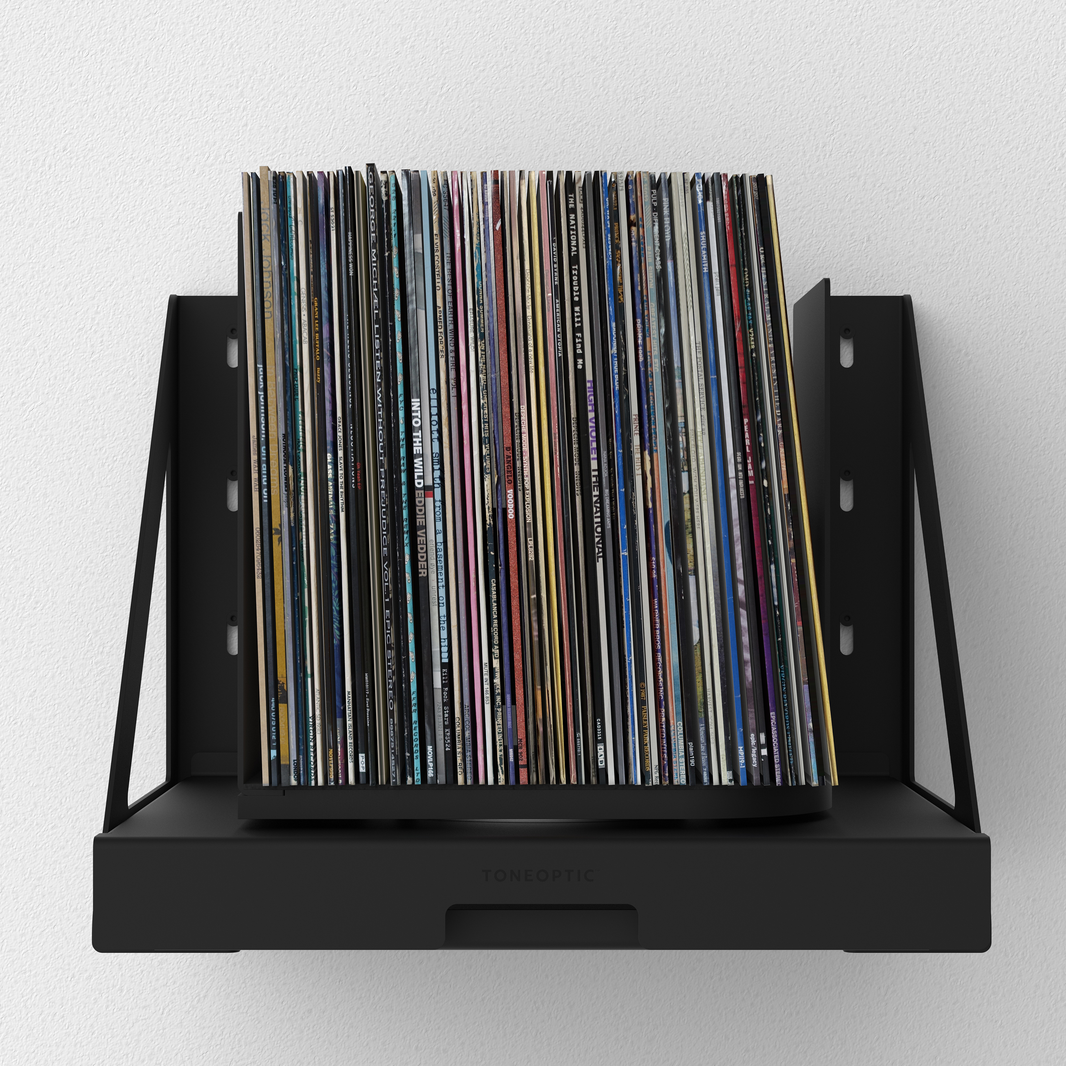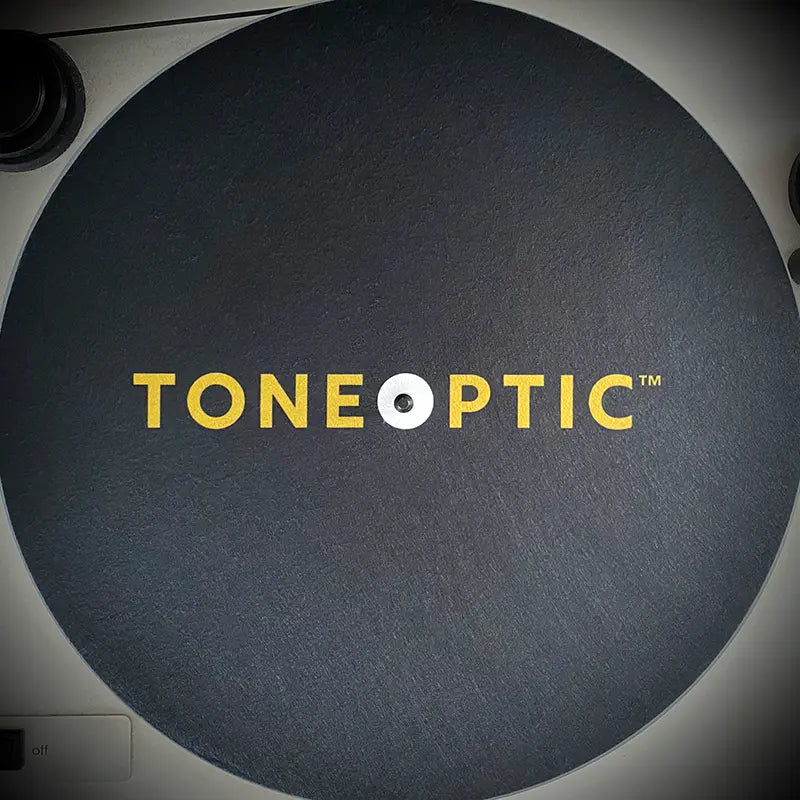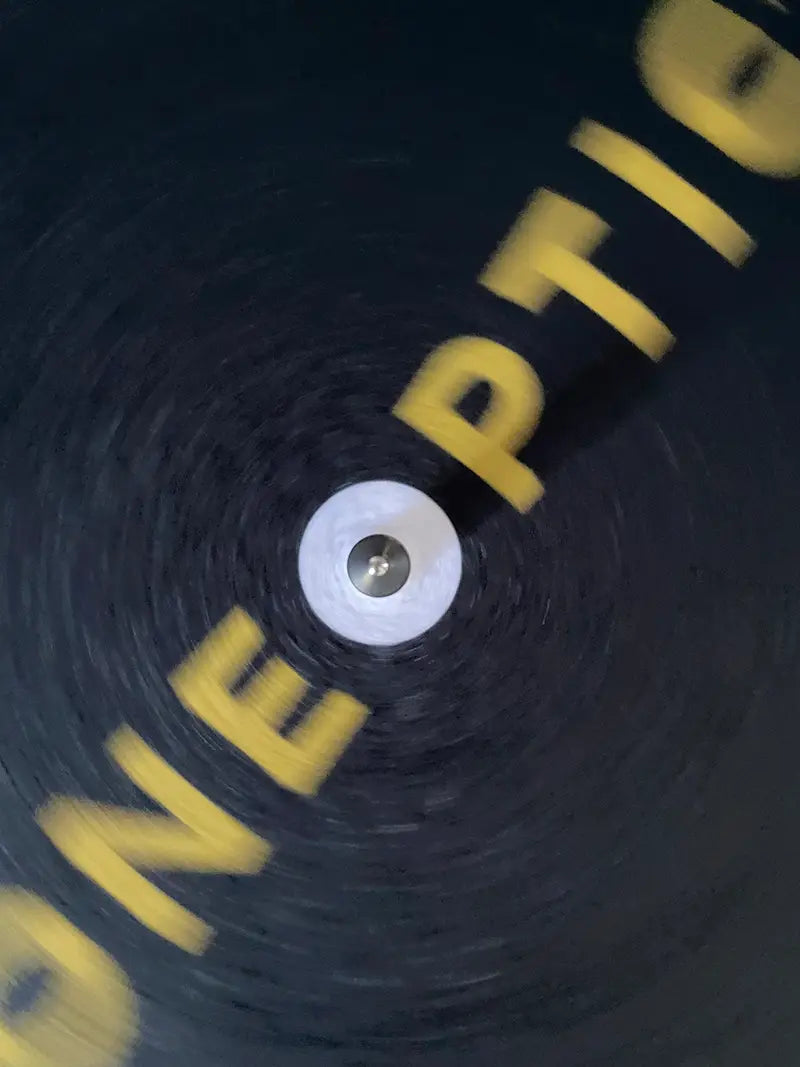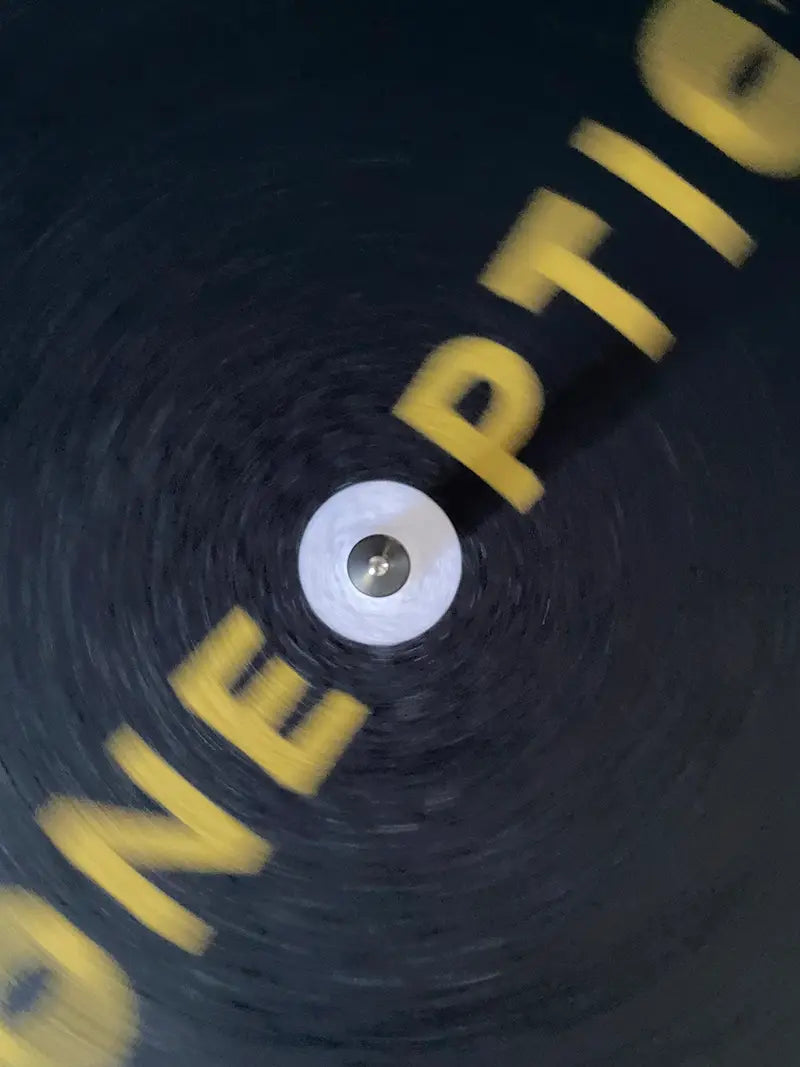

Skeme Richards
For many Skeme Richards is considered to be one of the best break DJs out there. Skeme has collaborated with some of the big names in Hip Hop and was part of the most recognized name in the B-Boy and breakdance movement, The Rock Steady Crew.
We take a personal tour through his 15,000+ record collection, learn what makes record digging exciting to him, plus he shares his favorite international vinyl stores and top albums of all time. Skeme further lets us in on the releases and artists he is most excited about right now and leads us back to his roots in block parties and growing up in a household that listened to the Godfather of Soul, Mr James Brown.
To accompany the interview we created a playlist featuring a lot of the songs and/or artists Skeme mentions during the conversation. Enjoy in the background while you listen to the episode, or opt to read below transcript. Regardless, get ready for some fantastic funk, soul and hip hop from the past to today. Enjoy:
Fabian Geyrhalter:
Welcome to the show, Skeme.
Skeme Richards:
Thank you for having me, happy to be here.
Fabian Geyrhalter:
It's wonderful having you. I know you're back on the road, Seattle tomorrow for a Strictly 45's night, Miami next week. So especially grateful that you found some time for us before you're heading back to the airport today.
Skeme Richards:
Always. I mean, I feel like these podcasta and different type of meetings and stuff has really gotten us through the pandemic and it kept everybody connected. So anytime I get the opportunity to do one, man, I'm really excited, because there's a lot of listeners out there. So that's what we're here for, to feed them great information.
Fabian Geyrhalter:
Totally. And I so agree. Right? So much has changed during the pandemic and that's one of the things. Right? We're suddenly all so far away from each other and so much closer than ever before. So it's interesting how it worked, but-
Skeme Richards:
Exactly.
Fabian Geyrhalter:
... just as a quick introduction, you're a DJ, you're a collector, you are the self-proclaimed Nostalgia King, a purveyor of rare gems, Heavy Funk 45 slinger, a burger connoisseur, record label promoter and preserver of culture. That's how you describe yourself on your Instagram bio. For others, they think Skeme Richards, and they think of you as one of the best break DJs out there. And then, they of course think about the most recognized name in the b-boy and breakdance movement, the Rock Steady Crew, which you've been a part of, for a long time. Tell us a bit about the early days though, of your musical journey and how you landed where you are today. How did you get into music? When did you get your first turntable? How did all of this happen?
Skeme Richards:
Music has always been a part of my life and my household. My parents always had records around the house, funk, soul, jazz, gospel, my grandparents always had records around. And just block parties as well like there were always summer block parties in the neighborhood and I would always see DJs. And of course, radio was a major part of musical culture, especially in Black households. It was a major part of like listening to the different genres, the funk, soul, jazz, disco.
Fabian Geyrhalter:
And that was like early '80s or late '70s?
Skeme Richards:
That was early... well, that was '70s. That was... because I was born in '71, so that's been a part of me, since the beginning. And then, when I started really understanding what was going on, it was the late '70s and seeing DJs at local block parties, seeing my parents throw house parties and playing records. And it wasn't until 1981 where I really got bit by the bug of wanting to be a DJ, hanging out with other kids that were... that I went to school with and their older brothers had turntables. So we would go to their houses after school, I'm talking about like fourth, fifth grade. We would go to their house after school and practice. And it was 1981, my parents bought me my first set of turntables and I haven't looked back ever since.
Fabian Geyrhalter:
What was the first record you ever bought? Do you remember?
Skeme Richards:
Yeah. It's funny. So the first record that I remember buying with my own money was Kool Kyle The Starchild on Enjoy Records, as well as Buckner & Garcia's Pac-Man Fever on 45.
Fabian Geyrhalter:
So you got... Right. I mean, your musical taste today and your musical taste back then. I mean, starting from the first records. I mean, it is all very, very on-brand. Right? I mean, it's really... you got that bug and it was immediately in a certain direction. Right? I mean, your musical taste has a lot to do with your upbringing. Right?
Skeme Richards:
Yeah, it does, because the foundation of hip-hop is James Brown. Right? And funk and soul music. So my parents was listening to that music. That's what I was listening to, but hip-hop made it so that was like, "Okay, that music is their music, hip-hop music is my generation's music." Fast forward to the present, it all comes full circle around, the music that I'm really into is the music that my parents were into, which was the foundation of hip-hop, the funk, soul, the jazz. When you think about it, all of the '90s hip-hop producers were sampling the jazz records of the '70s and '60s. So it all comes full circle around. So the music that I'm playing is very heavy on funk, soul, jazz, rare groove, disco. And a lot of that music is still being made today. It's not just playing records of the '70s, '80s, but there's a lot of jazz artists that are making incredible records now. A lot of funk and soul bands that are making incredible records now. So it all comes back around.
Fabian Geyrhalter:
I love that. And that's how it usually works. Right? The older you get, the more you understand music. The more you dig back into what you grew up with. And yeah, I love following you in Instagram and seeing all of this new stuff that comes out that 99.9% of music lovers are not even aware of. But there's a lot coming out that is... like you said, that is that genre, which to a lot of people has been a little bit forgotten.
Skeme Richards:
Yeah, it has. And the fact that there's so many independent record labels across the globe, there's such a plethora of things to choose from, but it's hard for the average consumer to really understand or find out or know about a lot of this music, because, although the internet and social media has made the world a such a smaller place, there's so much out there to dig through to get to the music that you might not know, but you really might need in your life. So I'm... I've just been fortunate enough to be connected to all of these record labels across the globe. And they service me with so much music and so many... so much vinyl, almost as is... as if it's the 1980s and there were record pools. And record labels were sending DJs' music all the time, so...
Fabian Geyrhalter:
Yeah. And I heard you on another podcast where you talked about... you still playing stuff that is not out there yet. Right? It's white-label, it's promos. And you're just excited to share that with people. And that sounds like such a thing of the past. And it's so wonderful, because I remember that going to the club and suddenly, like there's a new tune, no one ever heard or there's a remix that no one ever heard. And it's just... I mean, it's part of the excitement that is music, that is live DJ music.
Skeme Richards:
Yeah. And the sad thing is a lot of DJs have gotten away from that. A lot of DJs, they play the safe route and they want to play what's guaranteed on a dance floor. The original DJs broke new records, they played new records. And that's the thing about a DJ, a DJ is supposed to break records. I never cared about playing the safe route. I never cared about being liked, because my thing was, I'm going to play these records that you don't know that you need. And a lot of these records are comparable to what was great 20 years ago or 30 years ago. A lot of new records now are just as good and just as relevant. So yeah, that's my thing. I have to play records first. I have to break these records. And it's pride, it's joy to be able to say, "The reason why all these other DJs want to play this record is because they heard it from me first."
Fabian Geyrhalter:
Of course. Of course. Yeah. And look, I mean, calling someone a vinyl digger, a record collector's one thing, but you are something else. I mean, there are pretty much no digital releases, I think. Right? Almost all 45s in your life. Right? Most 45s, I assume you must have doubles off in order to do your work or you had to, back in the day. And I mean, talking about back in the day, your finds must have been kept a secret. Right? Doing break DJ battles. It was super competitive. Right? I mean, you have to keep everything kind of like under wraps. Right?
Skeme Richards:
Yeah. And that's the thing, that's what I love about the analog era of actually playing vinyl, because you actually had to have those records. So records that I was playing on the break scene, especially early 2000s where no other DJs knew what it was, like everyone was on a hunt. And that's a thrill right there to have everyone on a hunt, to find what you're playing. But as digital came along and people start discovering what it was and hearing it on YouTube, they could rip it off of YouTube or they could... it just wasn't... or they could rip it off your CD that you put out. And it just... it's such like a let down.
Fabian Geyrhalter:
Yeah. I mean, I totally agree. I mean, look... I mean, I'm a record collector by far not where you're at. But as a hobby, I've got like 1,700 or something, it's not a huge amount. But it's... for me, I could go ahead and buy the stuff I want online. Right? Like that rare gem that I'm just looking for, I can see it online. I could just hit buy. But instead, I'm crawling through record shops around the world until I finally find it. Right? There's still this... I mean, that's what it's about.
Skeme Richards:
Yeah. I mean, and we all buy online. There's nothing wrong with buying online.
Fabian Geyrhalter:
Sure. Yeah.
Skeme Richards:
The thrill is finding it in a shop, that's the thrill.
Fabian Geyrhalter:
Exactly.
Skeme Richards:
Because records come and go and if records were meant to find you, they'll find you. And as travelers and if you live in a city that has great record shops, records will eventually come to that shop. Now, I understand if it's something... if it's regional where it's like, "This is a Brazilian record." The chances of a Brazilian record falling in a shop in whatever city is rare.
Fabian Geyrhalter:
Yeah. Yeah.
Skeme Richards:
Right? But so there’s nothing wrong with buying it online.
Fabian Geyrhalter:
Look, I don't mean to say that I don't buy online. I buy a lot online, especially during the pandemic, a lot. Right? But it's... I don't buy those gems where I feel like, "Oh my God, will I ever see it again?" I'm like, "No, that I want to fight." I remember I was... I'm from Vienna, Austria, that's where my accent comes from, but I was in Austria and I found an Australian promo that I know they're like 200 in the world of. Right? And it was like for 400 euros and I'm like, "Oh, shoot." Right? That's a lot of money. And I have to go to the ATM, get the money out. Right? And do the whole thing. And I mean, it's worth quadruple now.
Skeme Richards:
It's worth it.
Fabian Geyrhalter:
But it was so amazing, that memory, that here you are in Austria buying an Australian promo that's like, they're only a couple of hundred in the world. I mean, it's beautiful.
Skeme Richards:
And that's my point. My point is the experience of being out in the real world and finding something. You can't... Like the stories of being able to tell that story 20 years down the line, how you found that record is amazing. Everything has to have a connection.
Fabian Geyrhalter:
Yeah.
Skeme Richards:
Everything. And just saying, "I was... I woke up 1:00 AM one night and I hit buy it now." That's not... there's no story to that.
Fabian Geyrhalter:
That's what I mean, there's this emotion. Right? And I love how you go on record shopping trips. I mean, I think it's awesome.
Skeme Richards:
You have to.
Fabian Geyrhalter:
Yeah. No, but I mean, I'm not talking about... here's Skeme Richards, driving down the block. No, you're driving to the airport, you're flying somewhere for a day, you know what I mean? And going digging.
Skeme Richards:
And that's my thing, because I look at like a lot of the '90s hip-hop producers, that's what they were doing. They were jumping on a flight and going to a record show in Atlanta or jumping on a flight and going somewhere. And that's how I pretty much book my gigs based off of is, what city has the best burgers, best beer and records. Right?
Fabian Geyrhalter:
In that order or not in that order? You're in a record podcast here. Come on.
Skeme Richards:
Yeah. Yeah. But it's like I... that's how I book gigs. It's like, "Okay, I want to go digging. I need to go book a gig, so I can go fly out and hit a record shop." Like that's how I base everything off of, it's based off of my collecting... fascination. That's why I'm a collector, I have to do that.
Fabian Geyrhalter:
Yeah. I mean, that's... I go in a lot of business trips. Well, I used to and I hope it's around the corner again. And I always add an extra day to every one of my business trips and I reserve it solely to go digging. Right?
Skeme Richards:
As well as you should.
Fabian Geyrhalter:
And I once took a flight from LA back to Vienna and I took the one flight that had an eight-hour layover in London, just so that I could Uber to town, hit up six stores, which in London, I mean, incredible. Right?
Skeme Richards:
Right.
Fabian Geyrhalter:
And then, I actually started documenting every single shop that I go to. And you do that too, I think maybe not every single one, but I saw some of your blog pieces, but I've got like 158 pictures now of my worldwide record store footprint.
Skeme Richards:
That’s good.
Fabian Geyrhalter:
And I love that, because I rate them. Right? I'm like, "Okay, this is how I love that one." So if I'm back in Atlanta or if I'm back in Pittsburgh or wherever, I know these are the stores I want to hit up again. And these are the ones I've already done. Right?
Skeme Richards:
Exactly. That's how I'm suppose to go.
Fabian Geyrhalter:
I love it. I've got your green light on that, on my behavior. That's good.
Skeme Richards:
Definitely.
Fabian Geyrhalter:
There are not many like us. But what makes... to you, what makes an amazing, memorable and successful record store experience? Like what is... what are the criteria where afterwards, you just come out and you're like, "Wow, that was worth the flight."
Skeme Richards:
The most memorable ones are the ones where you go. And the shop owner is very knowledgeable and he hips you to records that you didn't know existed or you didn't know you needed. To me, that's priceless, because you can go on a shop and you can see everything that you know on the walls or in the bins, and you can buy them. That's great. But it's the record shop conversation, it's the shop owner introducing you to stuff that you didn't know you needed, the stuff that's behind the counter or in the back that's not outside.
Fabian Geyrhalter:
I so agree. I so agree. It's the conversation that is just as important as what's in the store. Right?
Skeme Richards:
Exactly. Exactly. Because I've gone places and might not have bought too many records. I might have bought one or two records, but it was that conversation with the shop owner or someone else in there who was digging, which is priceless.
Fabian Geyrhalter:
Yeah. I totally agree. This is a tough one. What's your favorite record store you've been to, local or international, or maybe two or three, we don't have to single them out.
Skeme Richards:
So local shops. I mean, Toronto, Cosmos Records. Japan, I'd have to say Universe Sounds. And Amsterdam, I'd have to say Waxwell.
Fabian Geyrhalter:
Aha. Yeah, finally one I've been to.
Skeme Richards:
Waxwell and Red Light Records.
Fabian Geyrhalter:
Yeah. Yeah. That Red Light is hilarious. Yeah, that's awesome.
Skeme Richards:
Yeah. And Philly, I'd say Milkcrate Records, because I have a great rapport with those guys and they get some amazing records in. Yeah. Denver, Recollect Records. There's... Those are the top, I'd say those are the top.
Fabian Geyrhalter:
Okay. Okay. Because they can keep going. We can go by continent, by country, by...
Skeme Richards:
Yeah. But I'd say those... I'd say Cosmos Records in Toronto, Red Light and Waxwell in Amsterdam, Recollect in Denver and Milkcrate in Philly.
Fabian Geyrhalter:
And Red Light makes so much sense for you, because I've just been there two years ago, right before the pandemic, actually. And I mean, the location is just so weird. Right? And then, you go in, you're like, "Oh my God." Like for that size of the store, because it's tiny. Right? I mean, it's this tiny little thing. I mean, the stuff that they have is just mind-blowing.
Skeme Richards:
The quality is ridiculous.
Fabian Geyrhalter:
Yeah. Yeah. And it feels like you're hanging out with your guys. I mean, you just walk in and you're immediately part of the family, like the second you come in. Right?
Skeme Richards:
Exactly. Exactly. So I love that. I really love that.
Fabian Geyrhalter:
How do you think... I mean, look, record prices are at an all-time high. Right? I mean, you can go to Barnes & Noble to a whole vinyl section. Right. It turned completely mainstream again, which in a way is a really beautiful thing. Right? But it also is a little bit strange. And people, who have never entered the record store or never in the last 35 years, they're suddenly showing up. How does that affect record digging for someone like you, who is spending hours over hours going through crates to find the grills?
Skeme Richards:
Well, I dig from a different patch of what other people do, so that's-
Fabian Geyrhalter:
True. True.
Skeme Richards:
... like the average consumer, it doesn't really bother me. What bothers me more is the fact that the major labels have jumped back on the vinyl bandwagon and the price of records have gone up, the pressing times for labels to get product pressed has turned into a one-year wait versus a three-month wait, because major labels have jumped back into the game and they're pressing up records that don't need to be repressed.
Fabian Geyrhalter:
Greatest hits of everyone on 180. Right? 180, and that's it. And yep.
Skeme Richards:
Exactly. So that annoys me more than the consumer or it being sold at Barnes & Noble. It... the record... the major labels and the pressing plant's working together, pushing the little guy out when it was the little guy that kept... that pressing plants in business for the last 20 years.
Fabian Geyrhalter:
So true.
Skeme Richards:
Definitely.
Fabian Geyrhalter:
I totally agree with that. Yeah. Yeah.
Skeme Richards:
So I mean, but it is what it is. The thing about life is you have to adapt. And the way I look at it, when... me and Supreme La Rock would say this all the time, when we were buying the funk 45s, no one was... not like, it wasn't a trend, the 45 thing wasn't a trend. So we could still get the records cheap, when everyone jumped on the 45 bandwagon and prices started going through the roof. We said, "Okay. We're just jumping back on the disco 12 inches now." Because the 12 inches were so cheap.
Fabian Geyrhalter:
Yeah.
Skeme Richards:
So it's adjusting and we figure out ways how to adjust.
Fabian Geyrhalter:
Yeah. No, it's totally... I mean, that's how it works and it is kind of exciting to see these waves. Right? And you're adjusting. And like what do you do next? Right? And one wave that I feel like you haven't really jumped on is Spotify, all these online algorithms. Right? Because DJs still play from their heart. And what are your thoughts on the way that these services are kind of doing the exploring for people?
Skeme Richards:
For the average consumer, that's great. I still believe in hearing a mix on SoundCloud or Mixcloud from a DJ, who I know or might just be familiar with, and hearing something and then getting excited, because he played it in a mix.
Fabian Geyrhalter:
Yeah.
Skeme Richards:
Right?
Fabian Geyrhalter:
Yeah.
Skeme Richards:
Because see, when DJs played things in the mix, it's in context. If you're just hearing it on an algorithm, you could hear one genre here and then it bounces over to something else. There's no context with it. So for me, it's like it's context. When I hear a DJ playing a record and he's playing it well and he brings something else in. And I'm like, "What is that?" It's all context.
Fabian Geyrhalter:
Well, it's kind of... while talking about context, it's kind of hilarious that Adele was the artist that actually finally brought Spotify to not have a shuffle automatically, but actually play the songs in the way that they're supposed to be played, in order.
Skeme Richards:
Right. Right.
Fabian Geyrhalter:
It took someone like Adele to do that, talking about, who's actually pressing the records these days. But yeah. I totally agree. Let's go back for a second, for those not familiar with the art of breaking, which I include myself in, despite having once attended the Scratch Academy in LA for all of one hour and I was struggling through it. And it was tons of fun, but I was like totally over my head. And can you give my listeners and my myself some idea on what it actually takes to do you do flawlessly, the art of breaking so to speak?
Skeme Richards:
Are we talking about my breaking records or...
Fabian Geyrhalter:
B-boy. Right?
Skeme Richards:
B-boy, so are we talking...
Fabian Geyrhalter:
Breaking Battles.
Skeme Richards:
Yeah.
Fabian Geyrhalter:
Yeah. Yeah. The Whole Nine.
Skeme Richards:
So breaking for people that don't know, the media term is breakdance, but breaking is what it's called. It's called b-boying or breaking, which is the hip-hop term for it. And it's basically, dance battles or cipher battles, which are just pretty much just people getting down in a circle. And as a DJ, the DJ's job is to keep the circles going, the same way it is to keep a dance floor going and that's what I do. So the key is playing a lot of known songs with a lot of unknown songs, which brings excitement. And because you can dance to it. You could have heard a song 50 times and you're going to dance to it the same way every time.
But if you hear something new for the first time, it brings new excitement and you're going to dance to it totally in a fresh new way. It's like a kid in a candy store. Right? So as a DJ, that's what I do. It's comparable to being in a club. You want to hear some songs that you know, but you want to hear a lot of songs that you don't know, because it's going to make you have new excitement on the dance floor. So yeah. So for breaking, it's just... DJing for battles is about keeping the flow going and introducing something new, introducing something that's funky and separating yourself apart from what other DJs are going to do, because, personally, your personal collection is just that. Your personal collection. Right? And it's something that has a connection to you. So what separates every other DJs is... My connection to my records, makes me spin my records much better. You can't play my records the way I play my records, because you don't have that connection to those records.
Fabian Geyrhalter:
I love that. Yeah.
Skeme Richards:
So, it's like... Yeah. So as a DJ playing for breaking battles and just like breaking jams in general, it's just about keeping the floor going and playing great music. But it's in context, you're playing funk, soul breaks, anything with a break, whether it's James Brown or it could be a jazz record that's got a really funky drum break in it or a Latin break. It's just about keeping things in context. You don't really play disco. You don't play broken beat. It's all in context of like that funky era.
Fabian Geyrhalter:
How big is your collection these days? Do you know? Do you have any oversights? Do you have them on Discogs?
Skeme Richards:
You know what's crazy? A lot of people count and I'm like, "I've never counted records." I would probably say... I would say it's about 15,000. And to a lot of DJ homies, that's nothing.
Fabian Geyrhalter:
Yeah.
Skeme Richards:
But for me, my thing is quality over quantity. Right? I've had a lot of records and I've gotten rid of a lot of records. Why? Because if I'm never going to play it again, I don't need it taking up space.
Fabian Geyrhalter:
And someone else might enjoy it. Yeah.
Skeme Richards:
And someone else might enjoy it. Like I see guys that go out here and somebody will say, "Hey, there's a crate of records for $100." And they'll buy that whole crate of records. Me, I don't need 10 Diana Ross records. I don't need... you know what I'm saying? I don't need 10 of the same records. So for me, I've gotten records over the years, because what I liked in say, 1991 to '95, when I was producing, the records that I was sampling from, because it had one drum break on it, I don't need those records anymore, because I'm never listening to those records again.
Fabian Geyrhalter:
Yeah.
Skeme Richards:
Right? So I would say anywhere between 15,000 and 20,000 records.
Fabian Geyrhalter:
Amazing. Yeah. And I mean, for you... I mean, a lot of records are just utilities to a certain extent, because you just need to take something out. And that's it, you move on. You're not going to do it again.
Skeme Richards:
And see, I'm a working class DJ. So if I'm not playing it out or if it's not something that I listen to at home, then me just having it just for the sake of making my crates look pretty, it's pointless.
Fabian Geyrhalter:
Yeah.
Skeme Richards:
I got rid of a lot of stuff. I got rid of a lot of like early '90s hip-hop stuff, because I'm just like, "I'm not really playing this stuff anymore." And I have it on Serato, if I really need to play it.
Fabian Geyrhalter:
Yeah.
Skeme Richards:
I'm not carrying those records out, but like the funk and soul and the disco 12 inches and the rare groove, that's the stuff that I'm playing out. And that's the stuff that honestly has aged really well.
Fabian Geyrhalter:
Mm-hmm. Yeah. No, totally. And, is there a certain artist, a certain group that you feel like you have the most records off, something where like that's something that you just keep collecting or not really?
Skeme Richards:
So like all of the early Kool & The Gang stuff. All of the really, really funky Kool & The Gang stuff, before they kind of got a little commercially, I'd say a lot of Jimmy Smith in the jazz world. A lot of Jimmy Smith. Honestly, anything in the jazz world, I feel like I collect a lot of those same artists, the Jimmy Smith's, the... who else? Just all of the jazz guys, especially the jazz guys, because I feel like you have to be a completist... in the sense, when it comes to like jazz, like you can't just have the one record by that guy. It's like you have to have all 10 of those records by that guy.
Fabian Geyrhalter:
Yeah. Yeah. Yeah. Yeah. Totally understand.
Skeme Richards:
And then, you get into the soundtracks. So it's like, I collect soundtracks.
Fabian Geyrhalter:
Yeah. You're big into soundtracks. Right?
Skeme Richards:
Yeah. Like all the Black exploitation soundtracks, then you have to get some Italian soundtracks. And then, the exploitation stuff. And it's just all across the board. And as a collector in general, like there's only, but so much space. I'm a toy collector. I'm a film, movie poster collector, like a flyer collector, like there's just... I can't have a bunch of records that I'm never going to use, that basically can be used otherwise.
Fabian Geyrhalter:
If you would go through your entire collection of 15,000, which wouldn't take too long, which record do you cherish the most? Is there one record where it was one of your first or it was that one find or it was something that you just have a really special relationship with? Maybe one of your own pressings, is there... like if I would tell you, you can only take one record with you and you got to leave the house, what would it be?
Skeme Richards:
That's a good question.
Fabian Geyrhalter:
Well, thank you. It’s also a difficult one.
Skeme Richards:
There's... I mean, it's like your children or like your pets, you can't really just pick one. But I would say one record that really, really means a lot was a record that me and my partner, who... DJ Groove, Freddy Blast, he was the guy that taught me really how to DJ and really how to produce and make beats. We produced a song for MF Doom on his Venomous Villain 2 album called R.A.P. G.A.M.E. That right there, that record would probably go with me.
Fabian Geyrhalter:
Because it's meaningful. Yeah. No, totally. And then, on the opposite side... I mean, I personally love spending some quality time on one-dollar bins, because that's usually the stuff that people don't like and there's something in there, very often, it's a guilty pleasure. There's a reason why people don't like it. And is there... like it's a record that I would pick up and I'm like, "This means a lot to me, but everyone else thinks it's completely worthless." And is there anything like that in your collection? Where you feel like, "I got that for like 90 cents and it is absolutely bonkers."
Skeme Richards:
Oh yeah. I mean, I can't even think of what a title would be right now, but there's plenty of dollar bin records that I've bought. Yes. Over the years, without a doubt. It might have been something I bought and I heard a sample on. There might have been something that was just like, "Okay, there's one cut on this whole album." That's just a great album, without a doubt. I don't discriminate when it comes to price, that's one thing I don't because it's all about what's on that, because like you said earlier, a lot of records are like really expensive now. And in my opinion, they're expensive for no reason at all. Just for the sake of because vinyl is the hot thing.
Fabian Geyrhalter:
Yeah.
Skeme Richards:
Right? So a lot of those records that are the hot records now, were $2.99 records before.
Fabian Geyrhalter:
Totally. I know, well, it's hilarious too, because you go into some shops and you find in the one dollar bin, the exact record, it just has been re-released for like forty dollars on double vinyl. Right? And you're like-
Skeme Richards:
Yeah.
Fabian Geyrhalter:
... it doesn't even sound as good.
Skeme Richards:
It doesn't sound as good. Some of these like reissues and like these remixed and remastered, I'm like, "They don't sound good." First of all, if music was made in the 1970s, it was made with certain instruments.
Fabian Geyrhalter:
Yep.
Skeme Richards:
It was recorded and mixed down with certain equipment. Somebody going back 30, 40 years later when it's digital. And you trying to go back and remix that album, you're coming with a digital ear. That person was in an analog world.
Fabian Geyrhalter:
Yeah.
Skeme Richards:
And created an analog world. So that's how that record was supposed to sound. That's how they wanted it to sound.
Fabian Geyrhalter:
Well, yeah, totally. I mean, you already start with a disadvantage. Right? Even trying to do it. And look, I mean, there are some from the original tapes, etc, etc, that where maybe the recordings weren't that great in the beginning and they're amazing now. There are definitely some of them. But for the majority, I'm 100% there with you. I mean, it's just-
Skeme Richards:
Yeah.
Fabian Geyrhalter:
... because quality changed. And I mean, just now, when you think about the demand in the record production. I mean, of course the quality is going to suffer, because you're just going to have to churn these things out. And then, you got to use any machine that's around.
Skeme Richards:
Yeah. And so I respect like the guys, who had little equipment and put out amazing songs, I give them so much respect versus the guy, who has all of the equipment and your songs are... they may sound clean, but they're not as good as those other songs that were made in the '70s.
Fabian Geyrhalter:
Well, and you're still working. You, yourself is still working with some of those super small labels that put out, like... I don't know, 200 or 500 of your 45s as super limited. And I'm sure, they are the kind of people that have that kind of quality.
Skeme Richards:
Exactly. Exactly. Like Funk Night Records and... like Funk Night Records is one of the major independent records, because they put out so much every year. And they've been doing it for 15 years. Putting out some of the best funk, soul stuff. And now, they're putting out a lot of like really amazing jazz records with like Misha Panfilov from Estonia, Markey Funk from Israel, who has the Delights label, he's putting out a lot of like psychedelic sound tracky-type stuff, cinematic funk. These guys are like putting out some amazing music.
Fabian Geyrhalter:
And I can't even tell you how appreciative I am, I mean, us doing this interview is one thing, but I actually got lost in all of your recommendations last night. I mean, I bought stuff. I bought the Kista album from the UK last night. I mean, I just had to order stuff, because I'm like, "Look, there are not even many copies of all of that stuff out there that you share with people." And I highly recommend anyone, who's interested in soul and funk and hip-hop and jazz and anything in between to follow @SkemeRichards on Insta and of course, everywhere else where you can be found, because it's amazing how you share these releases. What is a recent release or one of the latest releases that you're super excited about?
Skeme Richards:
Muriel Grossmann, a jazz... a saxophonist jazz artist from... she lives in Spain. She's from... where is she from? She's not from Spain, but she lives in Spain. Amazing jazz artist and-
Fabian Geyrhalter:
Very cool.
Skeme Richards:
... releases some of the most amazing jazz LPs, ridiculously, like she composes produces, The Whole Nine, like she's amazing.
Fabian Geyrhalter:
That's fantastic. I’ll have to check it out.
Skeme Richards:
Yeah. But like also anything Misha Panfilov does from Estonia. Like this guy's a musical genius who... he doesn't sleep. He's in the studio sun up to sun down and he puts out some amazing music. Like there's so many low-key artists that the masses would never know about, but these people are just like geniuses of our time.
Fabian Geyrhalter:
I can't wait to listen to all of this. And we usually put together a playlist that goes along with this podcast, where we try to get as many of the artists that you mentioned into those playlists. So I'm looking forward to putting that together as well. To slowly finish off, top five albums in no particular order.
Skeme Richards:
Top five albums. Okay. Let's see. I would have to say The Pharaohs. What is the name of the album? I'm so bad with titles. It's so crazy. I'm bad with titles.
Fabian Geyrhalter:
Hey, that doesn't work in your profession.
Skeme Richards:
No, it doesn't. You know what's crazy? Because I'm more a sight guy. So if I see a label I'm like, "I know, I know what record that is." But if you ask me, "Hey, what was that record with the orange label?" I'll be like, "Um." And I'll go back and look, like, "It's so and so." I'm bad with titles. But I would have to say The Pharaohs LP, whatever the jazz… I'm bad. I'm bad.
Fabian Geyrhalter:
It's okay. Yeah.
Skeme Richards:
The Pharaohs, then I would have to say Jimmy Smith, Root Down, then I would have to say...
Fabian Geyrhalter:
Two down, three to go.
Skeme Richards:
Let's see. I would have to say A Tribe Called Quest.
Fabian Geyrhalter:
Of course.
Skeme Richards:
Instinctive or... I'm going with Low End Theory.
Fabian Geyrhalter:
Okay.
Skeme Richards:
Then from there, I would have to say... Good question. Good question.
Fabian Geyrhalter:
And this is not the ultimate top five list of yours. These are the top five that come to mind, because otherwise this is going to be too stressful.
Skeme Richards:
Yeah. My top fives are always constantly changing, depending on the season or my mood. It's always... it's constantly changing. So number three, I would have to say...
Fabian Geyrhalter:
I think we're on number four now. I think we're doing good. Yeah.
Skeme Richards:
Four.
Fabian Geyrhalter:
Yeah.
Skeme Richards:
I would have to say Gang Starr, Hard to Earn.
Fabian Geyrhalter:
Mm-hmm.
Skeme Richards:
And James Brown, Black Caesar soundtrack.
Fabian Geyrhalter:
I was wondering when James Brown comes in.
Skeme Richards:
Yeah. James Brown's got so much and I'm like, "Which one?" But like James Brown, Black Caesar soundtrack.
Fabian Geyrhalter:
Cool. Awesome. That is fantastic. Look, I know you're off. You're catching a plane now. What's next for you musically? Like any releases of your own... any mixtapes, big events, collaborations that you can share that you're excited about in the next six months?
Skeme Richards:
Yeah, so we just sent off my next 45 to the pressing plant. So hopefully, by August that'll be ready to go. I have a new cassette dropping, I'd say in the next month, month and a half.
Fabian Geyrhalter:
So those are literally mixed-tape cassettes that you-
Skeme Richards:
Yeah. These are literally-
Fabian Geyrhalter:
... scraped from vinyl.
Skeme Richards:
... Yeah. Physical. So I just have to send the artwork in, so it can get duplicated, that’s Shifting Gears III, which... Shifting Gears III is like the diggers mixtape of the unknown or the rare samples, sound bites, drum breaks, just records.
Fabian Geyrhalter:
So cool. Looking forward to that.
Skeme Richards:
So... and then I have another one, which is all funk 45s that I'm dropping like right after that. I have... honestly, I have probably about seven or eight cassettes, I'm going to drop this year. Yeah. I have about seven or eight, I'm going to drop and that's... plus whatever collaborations come my way. I want to do another compilation project with Funk Night Records. I did two previous ones with them, where I took their catalog and just did a whole mix of their catalog. And hopefully, I can get back to Japan as well to work on some stuff, because that's always a favorite destination as well.
Fabian Geyrhalter:
Which makes so much sense. Yeah. I totally get that. Look, it is such a pleasure to talk with people like yourself, who are so... I mean, you're just in it. I mean, the passion is just coming through the air here. And it's really amazing, and-
Skeme Richards:
Yeah, I think it keeps me young. This is what keeps me young.
Fabian Geyrhalter:
... Yeah. Yeah. No, for sure. I totally understand. And I can very much relate. Skeme, where can people find you, Nostalgia King?
Skeme Richards:
Yes. You can find me on nostalgiaking.com. I do a lot of record reviews over there, as well as I post up photos and recommendations of my tours and travels and record shops and food, because I'm a big food guy. So like burger connoisseur, ramen connoisseur, beer connoisseur. So if you love to eat, you can follow me there as well.
Fabian Geyrhalter:
Food and music, it doesn't get much better. Right?
Skeme Richards:
I mean, it gets no better than that. Right? Well, because the three things that connect the world are food, music and culture.
Fabian Geyrhalter:
Yeah.
Skeme Richards:
And as Nostalgia King, I embodied those three things.
Fabian Geyrhalter:
That's awesome.
Skeme Richards:
So Instagram, you can find me @skemerichards at Instagram. Yeah. And I'm around, I'm here.
Fabian Geyrhalter:
Yeah. I know. You're very approachable. Which also shows by you coming on my show, even though it's a very, very young show, still this was absolutely amazing. And quite frankly, I can't wait to jump into a lot of the stuff that you hooked us up with this morning. So thank you so much for your time. Have a safe flight. And we'll talk soon, Skeme.
Skeme Richards:
Thank you very much. I appreciate being on. And thank you to everyone that's tuning in. And have a good day.
Fabian Geyrhalter:
My pleasure.
JOIN THE LIST
Enter your email to stay tuned
SUBMIT
Support
Contact
Order Status
Returns
FAQs
Social
Instagram
Spotify
Facebook
© 2023, TONEOPTIC Powered by Shopify


